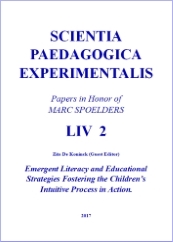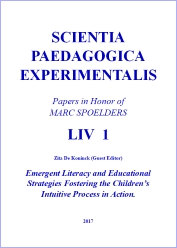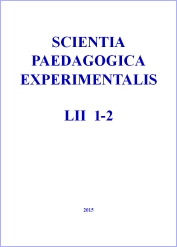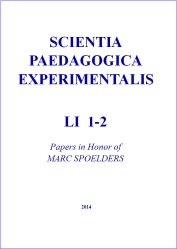|
SPE 57, 2 (2020)
|
CONTENTS
|
||||||||
| Abstract Teaching to the Test and the Italian National Assessment of Mathematics. Daniel Doz & Jurka Lepičnik Vodopivec Teaching to the test means to use part of the curricular school hours to prepare students to a test, showing them solving methods and focusing on the topics, which are more likely assessed by the test. In Italy, the INVALSI institute is responsible for preparing national assessments of knowledge for the evaluation of the quality of the educational system. Mathematics is assessed also in grade 8 and grade 10. In the present work, we investigated the presence of the phenomenon of the teaching to the test in North-Eastern Italy. Through an online questionnaire, we gathered the data among N=84 Italian middle and high school teachers, showing that the phenomenon of teaching to the test is present in the majority of those teachers, who teach to grade 8 or grade 10 students. Moreover, we found that more than half of the teachers, who prepare their students for the national assessment, solve some specific exercises taken from old national assessments; some teachers do also include some questions taken from national assessments in their formative and summative tests. When asked about the quantity of school hours invested in preparing their students for the test, we found that, on average, teachers spent M=6.98 hours, which represents 2-3 weeks of regular lessons. Teachers do however believe that national assessments should not influence students’ final grading; statistically significant differences were found among high school teachers who did and did not teach to grade 10 students.
Perceptions des pratiques des enseignants de mathématiques en fin de secondaire: quelles influences sur les choix d’études STIM? Doriane Jaegers, Virginie Dupont & Dominique Lafontaine The present research conducted on a sample of 6th year secondary school students in the Wallonia-Brussels Federation aims to study the influence of the perception of mathematics teachers' practices, on the aspirations for higher education with a strong mathematics component on the one hand and, on the other hand, on three motivational variables (self-perception, feeling of self-efficacy and perceived usefulness of mathematics) known to favour this choice of orientation. If the cognitive activation practices are directly favourable to aspirations for mathematical studies, the perception of relevant teaching is positively related to self-perception and the perceived usefulness of mathematics (particularly in courses with low hourly volume).
Problems with Teaching Critical Thinking. Hasmik Hovhannisyan & Robert Djidjian This paper outlines main difficulties arising in the process of teaching the different levels of critical thinking. The first of these difficulties concern the basic level of critical thinking, which we consider as the field of laws and rules of traditional formal logic. The principal task here is correcting the thinking of those students who allow invalid inferences in their judgments. The next level is related to the means of analytical thinking and forming the required competence of understanding subjects under discussion. Here teachers confront the problem of understanding the essence of understanding. The most serious difficulties may arise at the level of teaching students the ways of independent thinking. The core problem here is that of the mechanism of idea generation. This paper discusses also difficulties related to the meta-level of argumentation and methodology of scientific revolutions. The final section of this paper demonstrates the method of critical resolution of classical paradoxes – the versions of the “Liar” paradox and Zeno’s aporias.
BOOK REVIEW. Lin Wang & Gil Inana Starting from the recent publication by Crombez Bart 2020 “ LEAN transformations : why LEAN works and how to introduce it with success” special attention is given in the domain of “Education Management” to the"Inconvenient truth" perspective concerning to dare to face, to take into account and to learn to deal with sabotage, thwarting, bullying, brainwashing (of victims). Between others it is crucial to recognize and to learn to deal with bullyboys, dyssocials, hypocrites, perverse narcissists… To be able to tackle efficiently these challenges, one must be aware that such people are rather becoming popular and successful and use these methods to promote their influence…
|
|
SPE 57, 1 (2020)
|
CONTENTS
|
||||||||
|
Abstract
Stochastics - Virtual Simulation using Mobile Technology. The present study suggests the use of modern mobile technology, as part of ICT, in order to improve the understanding of the concepts of Probability and Statistics at the ages of the early high school years and to develop the respective programming and modeling skills. In particular, android apps and spreadsheets were used for generating multiple representations on the one hand and the virtual simulation of a chance experiment on the other. The specific didactic framework was expected to lead students to construct their own mathematical models. The sample was consisted of 355 students divided into experimental and control group. Students were divided into three levels of performance based on their written assessments in mathematics in order to examine the accountability of the intervention in respect to their initial mathematical performance. Results indicated that there were statistically significant differences on students’ performance, between the experimental and the control group and those differences were higher in the case of the students with medium and high performance in mathematics. Unanswered questions, which need to be examined further, were raised about the low-level students. There was not any gender effect on performance due to teaching intervention in eight out of the nine tasks. The discussion concentrates on the learning outcomes derived by the specific intervention program and the role of the use of new technological tools in order to fulfill the relevant goals which are posed at different educational levels.
Extra-Curricular Activities and their Influence on Academic Performance in Primary Education. Mª Ángeles Pascual Sevillano, Eduardo Fernández de Oliva and Carolina Pascual Moscoso There have been various approaches to studying academic performance at school but few studies have analysed the influence of extra-curricular activities on student outcomes. This study is based on a quantitative non-experimental survey of a convenience sample of students in the final years of Primary Education, focusing on performance in Mathematics, Spanish Language, English, Physical Education and Art Education. The survey consisted of 79 students in fifth and sixth grade at two school centers. The out-of-school activities in which the students participated were classified in four groups (English, sports, creative and reinforcement) linked to the school subjects already mentioned. Academic performance in these subjects was measured in relation to the extra-curricular activities that the students do. The results show that taking English classes influences performance in that subject, with significant improvement in student grades. There is also a positive trend towards improvement in marks for Art Education and Physical Education among those students who actively participate in activities related to these two subjects.
Professional Authority and Teacher Agency. Kathryn A. Caprino, Sally B. Crane, Angela M. Kohnen and Jane S. Townsend Prospective teachers develop agency whilst negotiating input from competing and often conflicting authorities on pedagogy and subject-area curricula. In this article, the authors analyzed Julia’s—a student teacher and graduate from their university’s master's level, teacher-certification program in secondary English—experience with this negotiation. To explore Julia’s experience, the authors collected and analyzed a year’s worth of multimodal data: transcribed semi-structured interviews, field notes, lesson plans, post-lesson reflections, a video-recorded writing lesson, and a first-year-teaching survey—from which themes of agency and authority emerged. Exploring Julia’s negotiation of competing discourses in her development of agency and authority exposed the difficulty and complexity of this process. Julia’s transition from student to teacher challenged her to forego a desire to please outside authorities, such as school mandates and standardized assessments, and assume the authority of an expert, one with the agency to construct and organize effective instruction for her students. Julia grappled with a number of challenges in this process.
The Challenges of Nestors and Nestor Education. On the basis of a series of gnosts (a concise expression concerning a scientific point of view), some challenges Nestors (people aged above 70years) are confronted with are described. Next the possibility is investigated to develop an education strategy for Nestors and the challenges, needs and targets that have to be taken into account to be relevant for these Nestors and society.
|
|
SPE 56, 2 (2019)
|
CONTENTS
|
||||||
| Abstract
Educational discourse and digital media: toward co-regulated learning? Anne-Marie Cotton This paper reflects upon the triadic pedagogical relationship between teacher, learner and knowledge embodied through the educational discourse. When the discourse becomes dialogic, it implies more involvement and responsibility shared by both actors, teachers and learners, the latter acknowledging an increasing awareness of responsibility and engagement for their learning. The educational discourse also refers to specific socio-communicative practices activated when it is imperative to respond in real time to the ultimate educational questions being: what content is worth transmitting and how to optimally achieve the transmission from teacher and learner’s perspectives? Adding that virtual environments are conductive to reflection the author analyses the use by a European team of lecturers and Master students of digital platforms set up as vectors of knowledge within an Erasmus programme and questions their added value to the educational discourse. The findings highlight the nature of the interactions affecting the active participation, performance and learning of the students. Future programmes willing to embed collaborative work focusing on peers mediating each other’s actions toward a joint goal and aiming the use of asynchronous distributed virtual learning environment, could gain from co-regulation as a manifestation of emergent interaction within a Zone of proximal development with a teacher-indirect regulation.
FORMATIVE ASSESSMENT IN THE TEACHING AND LEARNING OF MATHEMATICS: TEACHERS’ AND STUDENTS’ BELIEFS ABOUT MATHEMATICAL ERROR Athanasios Gagatsis, Paraskevi Michael-Chrysanthou, Theodora Christodoulou, Elia Iliada,Giorgio Bolondi, Ira Vanini, The present paper discusses lower secondary school teachers’ and students’ beliefs about Formative Assessment in mathematics in Cyprus, Switzerland and Italy. Based on teachers’ and students’ beliefs related to formative assessment, this research is an attempt to compare the teachers’ and students’ beliefs in the different countries under study, regarding to the handling of the error in mathematics classroom. In total, 192 teachers and 1108 lower secondary school students participated in the survey and they completed a questionnaire about the formative assessment. The findings of the study reveal that the students’ beliefs in the three countries are identical, whereas teachers’ beliefs about mathematical error differ enough in the particular countries. |
|
SPE 56, 1 (2019)
|
CONTENTS
|
||||||
| Abstract
CULTIVATING AN eLEARNING CULTURE Jose Lloyd D. Espiritu, Kiran S. Budhrani Emerging technologies have hugely shifted the behavior of students, reshaped teaching methods and challenged traditional learning structures. The influx of technology in schools is non-negotiable. However, the education sector consisting of major stakeholders including teachers, parents, school administrators, employers and the government agencies are known for being extremely slow in adapting emerging technologies into learning. Consequently, eLearning has not taken off. If students are to fully benefit from eLearning and what emerging technologies can offer, the authors argue that all stakeholders need to be involved in cultivating an eLearning culture. This paper begins with analyzing the issues that each stakeholder group is currently facing, followed by a synthesis on global trends and innovations in technology and pedagogy and finally provides recommendations that each stakeholder group can use.
THE DYSSOCIAL-SYNDROME AS A LEARNING/RESEARCH MANAGEMENT CHALLENGE Lin Wang, Filip Muylle, Merlijn Balder The role of the Dyssocial-syndrome in the dynamics of an organization, inclusive educational institutes and especially its self- destructive impact is discussed. The relevance of detection, treatment and follow-up of this syndrome are highlighted.
CARE, LEARNING AND EDUCATION Vandamme Fernand, Zhi Dao The notions gnost, aphorism and meme are differentiated from each other, On the basis of a selection of gnosts, a method to generate challenging networks is proposed of interconnected ideas, targets, approaches, proposals, solutions, for ameliorating the understanding, the work and impact in and on care, education and pedagogics. |
|
SPE 55, 2 (2018)
|
|
||||||||||
|
ABSTRACTS |
|
|
Transculturality and Preschool Education – earnings from a Preschool Project in Wrocław/Poland. E. Chromiec
The article focuses on the current debate in the European scientific community on the change of the paradigm: from multiculturalism/interculturality to transculturalism/transculturality. Concepts of the theoreticians such as W. Welsch, A. Dagnino, M. Epstein are gradually gaining popularity in the Polish scientific community too. The text is also a presentation of an educational project “Multicultural Wrocław?” implemented in an English-language kindergarten in Wroclaw, with detailed accent on its multi-, inter- and transcultural background. |
|
|
Designing a Strategic Framework for European Computing Education and Training. P. Kaczmarski, M. Porta, B. Çiço, N. Frasheri, V. Cantoni, L. Wang, F. Vandamme Abstract: In this paper we summarize our research concerning the design of a long-term, large-scale strategic framework for European computing education and training programmes. Our conceptualization of the strategic framework for European ICT education is based on business process management (BPM) perspective, which is the key for defining a generic strategic framework. With this starting point, we review in this paper the generic strategic framework structure and discuss the design of the identified components from the perspectives of the European ICT education and European ICT job markets. The presented design focuses, among others, on the strategic goals, the priority areas, on convergence monitoring etc. We also present a new addition to the envisioned framework concerning standard ICT curricula adoption which enhances our original approach presented in (Porta, 2016a). It is important to note that, to date, there has been no attempt to provide a strategic framework for the area of computing education (the closest realisation has been the Strategic Framework for European Cooperation in Education and Training (EU-SF, 2009; EU-SF, 2012), which however covers different application areas and problem sets). Since the topic of designing and implementing a strategic framework for ICT is quite extensive, we focus in this paper on the preparation and design phases, and leave the implementation description to our future publication. |
|
|
The Nominalistic, Gnostic, Taoist, roots of Pedagogy. F. Vandamme Abstract: With this study it is investigated if and to what extent the nominalistic, Gnostic and Taoist traditions have influenced modern developments of Pedagogics in general and more particularly the pedagogical practice and research of Marc Spoelders. |
|
|
SPE 55, 1 (2018)
|
|
||||||||
|
ABSTRACTS |
|
|
Student Teachers’ and Teachers’ Attitudes towards Ecological Building of Schools Majda Cencič, Anton Mlinar
Studenten onderwijskunde evenals de onderwijzers/leraren en andere medewerkers, brengen heel wat tijd door in schoolgebouwen. De fysieke alsook de leeromgeving zouden daarom een positieve invloed moeten hebben en geenszins een belemmering zijn. Sommige onderzoeksresultaten stellen dat milieuvriendelijke of groene scholen een gezonder binnenmilieu hebben, wat betekent dat er minder ziektes zijn en dat het ziekteverzuimpercentage lager is; dat studenten ook beter presteren in dergelijke scholen; dat op ecologische scholen kinderen ook over een functionele leeromgeving beschikken, enz. Met betrekking tot deze bevindingen waren we geïnteresseerd om te bepalen wat de houding was van de studenten onderwijskunde ten aanzien van ecologische schoolgebouwen, daar bij een steekproef van onderwijzers in Sloveense basisscholen vastgesteld werd dat oudere leerkrachten ietwat positiever stonden tegenover ecologische schoolgebouwen dan hun jongere collega's. Met dit doel voor ogen hebben 299 studenten, toekomstige leraren van een faculteit Onderwijskunde, een vragenlijst ingevuld. Hun positieve houding ten aanzien van ecologische schoolgebouwen kwam daarin tot uiting. We hebben echter kunnen vaststellen dat de houding van de aspirant leraren jegens ecologische schoolgebouwen enigszins anders was van die van de praktiserende onderwijzers/leraren. De positie van deze onderwijzers/leraren was positiever dan die van de studenten onderwijs, wat aangeeft dat in het studieproces meer nadruk dient gelegd te worden op ecologische en duurzame ontwikkeling van scholen. |
|
|
Sprachunterricht: Tradition, Innovation, Experimente Bernd Spillner Samenvatting :
Allereerst worden twee zeer traditionele methoden voor vreemdetalenonderwijs besproken, de gespreksmethode (17e/18e eeuw) en de regel-vertaling methode (18e/19e eeuw). Hun voordelen worden onderzocht en de redenen waarom deze onbruikbare methoden zo lang in gebruik blijven worden geanalyseerd. Een korte omweg leidt ons naar Comenius, de voorloper van de semiotiek. Na te hebben besproken waarom zuiver taalkundige benaderingen zoals taxonomisch structuralisme, afhankelijkheidsgrammatica en generatieve transformatiegrammatica in de 20ste eeuw als taalonderwijsmethoden gedoemd waren te mislukken, worden Experimentele ('innovatieve') pogingen van de laatste 40 jaar kritisch geanalyseerd (onder meer taallabo, suggestopedia, autonomie van de leerling, drempelniveau, onderdompeling, TANDEM, e-learning). Hieruit kan afgeleid worden dat communicatief vreemdetalenonderwijs erkenning verdient.
|
|
|
A Review of Teacher Evaluation Beliefs Qiaoyan He, Qiu Ping Samenvatting : Het vertrouwen van leerkrachten in evaluaties heeft in de educatieve literatuur een aanzienlijke hoeveelheid aandacht gekregen, maar betrekkelijk weinig vanuit de literatuur die specifiek het vertrouwen zelf behandelt en onderzoekt. Als drijvende kracht lijkt “evaluatie” en “belief” zeer sterk op elkaar. Op basis van de student-gecentreerde en leraar-gecentreerde filosofie, geven we in de huidige paper een literatuuroverzicht om de essentiële componenten van de evaluatie “beliefs” te onderzoeken (waarom, wat, wie, wanneer en hoe), in relatie tot de grootste problemen van de hervorming van het Chinese nieuwe curriculum in verband met "waarom-doel", "wat-inhoud", "wie-relatie tussen leraar en student", "hoe-methode" en "wanneer-tijd". In overeenstemming met de bespreking van vijf factoren van evaluatie-overtuigingen, hebben we zes perspectieven voorgesteld om onderzoekers in de pedagogie te sturen bij verdere onderzoeken.
|
|
|
SPE 54, 2 (2017)
|
|
||||||||
|
SPE 54, 1 (2017)
|
CONTENTS
|
SPE 52, 1-2 (2015)
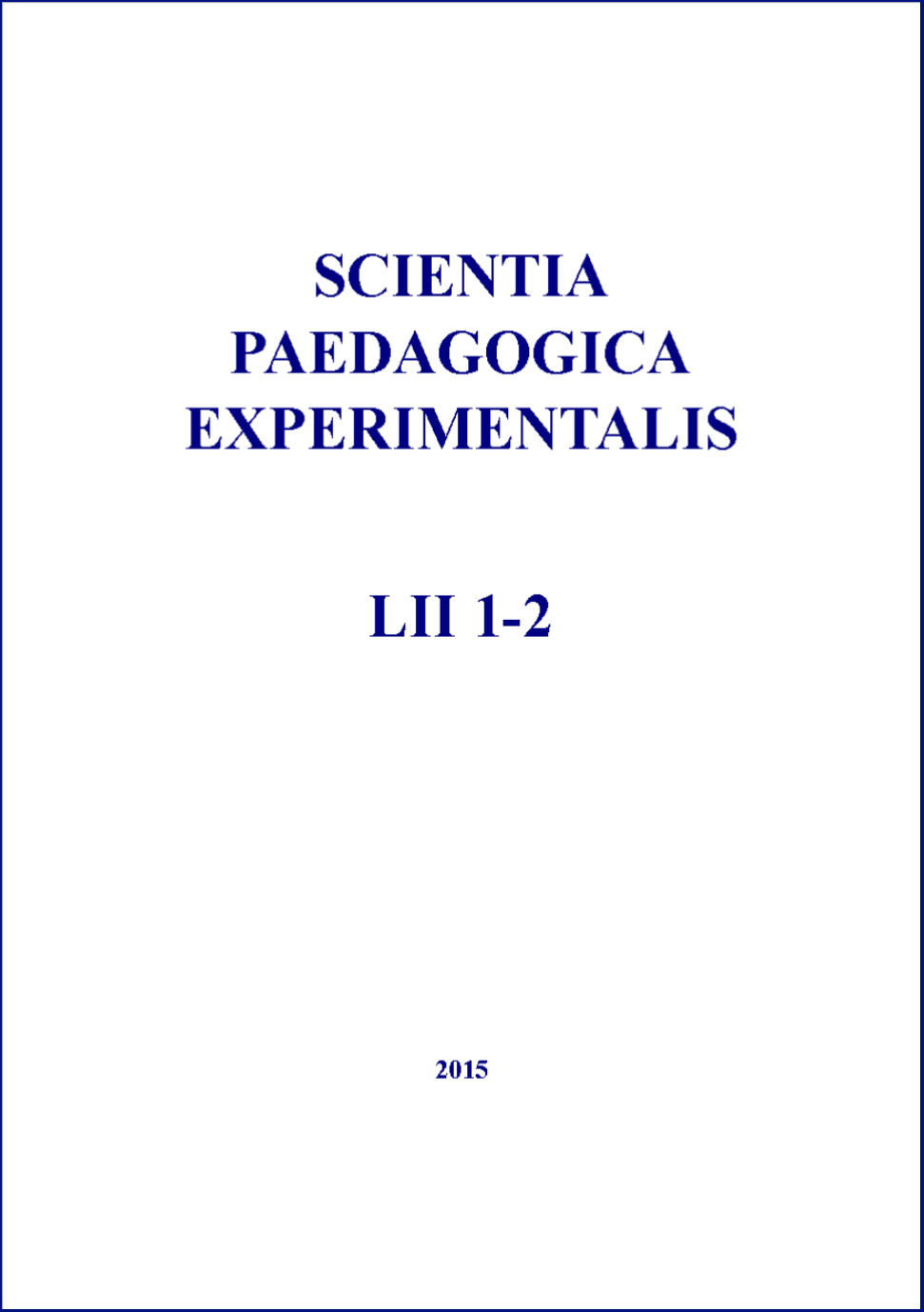
|
SMARTPHONE'S ACADEMIC USES IN EUROPEAN HIGHER EDUCATION AREA. A CASE STUDY IN SPANISH UNIVERSITIES Abstract Smartphones can be surprisingly useful didactic resources for developing academic tasks and competencies according to European Higher Education Area in both distance and face-to-face university studies. Through a quantitative analysis and factor analysis techniques, we have established the main smartphones' academic and general uses for improving learning processes in university subjects. To this end, a scale has been developed and validated to identify academic uses based on the participation of 419 Spanish college students from six Universities. The conclusions indicate that the use of smartphones in University studies is highly valued by students as a new format which both supports and enhances learning practices and can also foster collaborative work among students and professors. Therefore, it is recommended that universities continue developing new didactic strategies to connect both formal-informal and face-to-face ubiquitous learning settings. A FORMULA FOR AN OBJECTIVE MEASUREMENT OF STUDENTS’ UNDERSTANDING DIFFICULTIES OF A MATHEMATICAL TEXT. EVALUATIVE AND EDUCATIONAL USE Abstract This article provides an objective formula for the empirical evaluation of the understanding of a mathematical text by students of any level of education. Of this formula we suggest an evaluative and educational use. DEVELOPING AN E-LEARNING COURSE IN MOODLE FOR SOFTWARE TRAINING Abstract In this paper we present the implementation in MOODLE of an e-learning course for software training intended for advanced users of commercial software developed by a SME. The aim of this work has been to enhance the software training experience through e-Learning and to shorten the knowledge transfer path as compared to the classic software training approaches. To improve the e-course effectiveness we use e.g. video instructions, and add gamification elements to the course modules. The research presented in this paper was carried out in cooperation with, and with financial support of the European Thematic Network FETCH (Future Education and Training in Computing: How to Support Learning Anytime Anywhere, project number 539461-LLP-1-2013-1-BG-ERASMUS-ENW, http://fetch.ecs.uni-ruse.bg/). ANALYSE DES REPRÉSENTATIONS SOCIALES AU MOYEN D’UNE DÉMARCHE PLURI-MÉTHODOLOGIQUE Abstract This article aims to present a unique multi-methodological approach to collecting and analysing social representations by means of a questionnaire survey on the forms of education conducted with a total of 668 students of secondary education in Francophone Belgium. Four methods of analysis are used: the prototypical analysis, comparative analysis, control of the centrality and thematic analysis of open questions. The different methods, their practical implementation and the treatment support tools are presented and discussed. EARLY INTERCULTURAL EDUCATION – WROCLAW`S CONTEXTS AND PRACTICES Abstract The text provides an introduction to an innovative intercultural project implemented from 2013 in one of the preschools in Wroclaw, Poland. World War II with its massive expulsions and relocations increased the intercultural homogeneity of the city. However, in the last 20 years this trend has reversed, especially thanks to a growing community of foreign professionals working for the approx. 150 multinational corporations which have invested in the city. Moreover, public awareness for interculturality has been rising since Wroclaw was awarded the title of the European Capital of Culture 2016. The increasingly intercultural composition of the city’s population and the rising awareness for issues of interculturality also changes the image of childhood in a big city. The project presented in this article (project "Multicultural Wroclaw?") is an attempt to increase intercultural awareness among the children and equip them with skills for productive and tolerant ways of dealing with intercultural challenges in their city. |
|
SPE 52, 1-2 (2015)
|
|
||||||||||||
|
SPE 53, 1-2 (2016)
|
|
||||||||||
|
SPE 51, 1-2 (2014)
|
|
||||||||||||||








